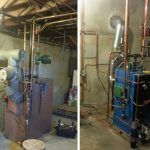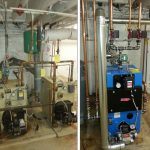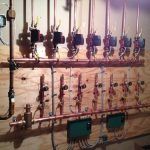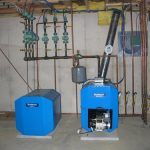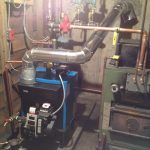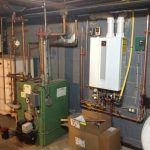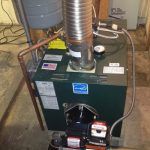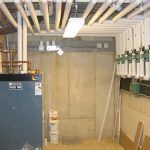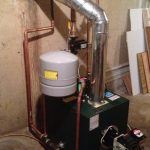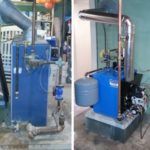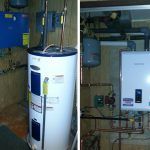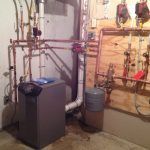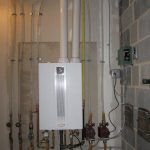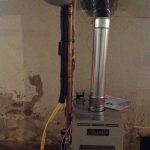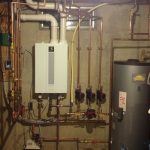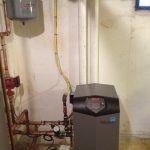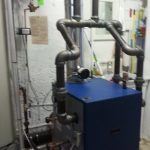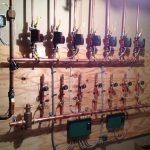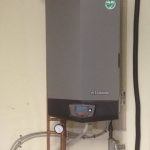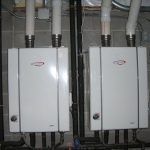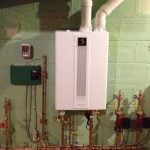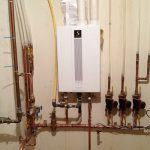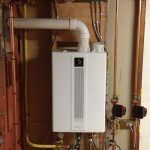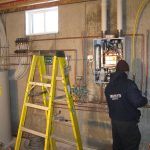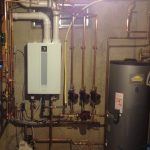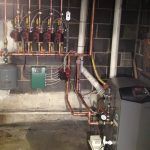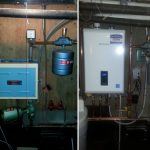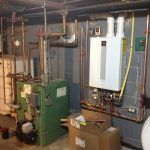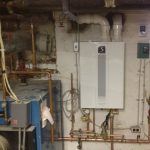Our Expert Residential Services Provide Peace Of Mind
When you choose to work with Burkholder’s, you can expect reliable residential services and first-class customer service from beginning to end as we work to keep your home comfortable. Our professional workmanship and work ethic from our NATE certified technicians is a top-notch level of service you can trust. Whether it’s a simple inspection, part replacement, or scheduled maintenance, we look at every element under a critical eye to ensure everything we do is done right — the first time.
We know there is nothing worse than a sweaty or ice-cold house when you need comfort the most, but you’re in the right place as Burkholder’s has repaired tens of thousands of residential and commercial HVAC systems in throughout the Lehigh Valley. Our most-requested services are:
- Emergency Repairs
- Oil + Gas Boilers
- Indoor Air Quality
- Inspections
- Maintenance Agreements
- Oil Fired Hot Water Heaters
- Zoning
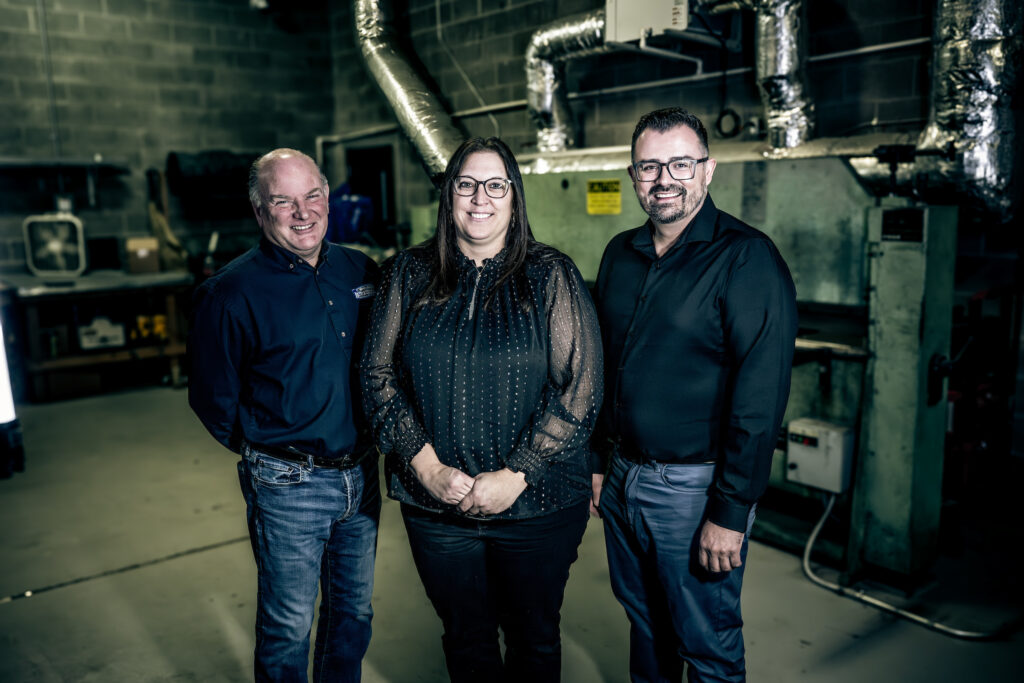
Emergency Repair
Emergency Heating & Air Conditioning Service
Need a Burkholder’s Residential Service Technician RIGHT NOW? Our On-Call Service Technicians will respond quickly to get your system back up and running. We’re only two steps away:
- STEP 1: For 24-hour Emergency Service, please call 610-816-6889
- STEP 2: Then Press “4” and you will be connected to a live dispatcher.
Is This An Emergency?
Emergencies include any dangerous situations compromising the health and safety of the residents (e.g., no heat in excessive cold, no AC in excessive heat)
Heating and Cooling System Basic Troubleshooting
Before you call Burkholder’s 24-hour Emergency Services, please check out our Home Self-Diagnosis Troubleshooting Tips below. This may help you resolve your issue faster and save you time and money. If these basic troubleshooting tips don’t fix your issue, call us!
Air Conditioning Troubleshooting Tips
- Check your Thermostat. Make sure the control is set to Cooling mode. Make sure your set temperature is cooler than the current indoor temperature. If the system does not kick on after setting the temperature, check the next steps.
- Check the outdoor condensing unit. If it is not running, take a look at your circuit breaker or electrical panel in your home. Make sure everything is in the ON position.
- Check to see that the main power switch on the outdoor unit is in the ON position. The power switch can be found mounted on the exterior of the house, just a few feet away from the unit.
- Is the blower motor in your furnace or air handler’s fan coil running? If the system is set for cooling, the blower motor should be running. If not, check to make sure your indoor unit switch is in the ON position.
Heating Troubleshooting Tips
- Check your Thermostat. Make sure the control is set to Heating mode. Make sure your set temperature is warmer than the current indoor temperature.
- Ensure that your furnace’s or air handler’s power is on. Try turning the fan to ON using the fan switch on the control or thermostat to test for power to the furnace.
- Make sure all circuits on your electrical panel or circuit breaker are in the ON position.
- Check the furnace power switch to be sure it’s in the ON position (it looks like a light switch on a gray box located at the furnace).
Under-Performing Heating/Cooling Systems Tips:
- Check the filter for buildup. If you have one-inch thick furnace filters, a once-a-month change is recommended. Two-inch-thick filters—and other high-capacity pleated filters—usually only need to be changed every other month or less, depending on the type. If you don’t change it, the filter will eventually become so full, it will block the proper airflow and strain your furnace.
- Check all return air grilles to make sure they are not blocked. Return air grilles are larger and are located on a wall or the ceiling in newer homes. Older homes frequently have return air grilles on the floor.
- Check all supply registers to make sure they are open and blowing air.
Oil + Gas Boilers
Reliability and Efficiency When You Need It
Oil boilers are still widely used in many homes today and our full offering of residential services are designed to keep your HVAC system running smooth all year. Like other types of boilers, oil is an efficient fuel source as it can heat up large amounts of water very quickly. In some newer, more efficient models, you may have the option to use recycled oil or bio-diesel fuels.
Oil boilers are a good water heating solution if you do not have the option to connect a natural gas line to your home, or if you have unreliable electric connections as you can still access hot water in a power outage. You will also need plenty of basement space to keep an oil reserve tank.
How It Works
Oil boilers operate very similarly to other boilers, but there are a few differences. In a typical boiler, you have a burner, which in this case, oil fuel is ignited and the heat exchanger transfers heat to the water in the pipes that travels through the home to provide heat in room’s radiators and drinking water. For an oil boiler, a fuel provider is needed to deliver oil into your oil reserve tank, typically located in your basement.
Unlike a gas boiler, you will also need a circulation pump. Although a convection current is present as the water heats up, it does not generate enough speed to circulate the water through the heat exchanger. The pump provides additional circulation. If the pump fails, the water is turned to steam, pressurizing the heat exchanger. This could cause pipes to either burst or melt. It is strongly recommended to have a professional clean and maintain your boiler and all of it components for the safety of the equipment.
Benefits of Oil Boilers
- Oil burns evenly and quickly.
- Recycled oil or bio-diesel fuel can be used.
- Some models can be installed outdoors, as well as indoors.
- Hot water is still available during power outages.
- Oil boilers offer an efficient solution in combination with a hot water heater for your domestic water needs.
Other Considerations
- Prices on oil are expensive and change often based on availability and location.
- High demand for oil and its available resource may lead to temporary shortages or outages.
- A chimney or external vent to expel gas is required for installation.
- A storage tank for oil takes up a lot of space in the home.
Oil Boiler Priority Service and Maintenance
Oil boilers should produce little to no emissions, and it can take a trained eye to spot a problem. Receive a complete once-over plus new fuel filter cartridges and burner nozzles. Most other key components, including burner fans and motors, are included with labor free of charge.
Gas Boiler Repair and Installation
In the United States, natural gas is the most common fuel for fired boilers today. It is an easily accessible resource and a cheap heating fuel. Unlike liquid propane or oil fuels, you don’t need to have a truck deliver it to your house—a gas line already runs underneath most homes. Home owners have the very convenient option to heat their house and provide heated water throughout their home with this single appliance.
Using Natural Gas
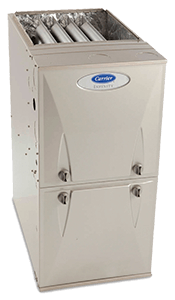 Natural gas, supplied to the home by an underground main line, is fed through a small pipe leading into your home. When the thermostat triggers the boiler to heat the house, a valve opens, releasing the natural gas into a combustion chamber in the form of small jets. An electric spark ignites the fuel. The fire heats the water-filled pipes that circulate through your home. The pipes connect to a radiator where the heated water emits heat energy into the room. Once the heat is exhausted into the air, the cooled water returns through the pipes leading back to the boiler to be reheated and circulated again.
Natural gas, supplied to the home by an underground main line, is fed through a small pipe leading into your home. When the thermostat triggers the boiler to heat the house, a valve opens, releasing the natural gas into a combustion chamber in the form of small jets. An electric spark ignites the fuel. The fire heats the water-filled pipes that circulate through your home. The pipes connect to a radiator where the heated water emits heat energy into the room. Once the heat is exhausted into the air, the cooled water returns through the pipes leading back to the boiler to be reheated and circulated again.
About Condensing Boilers
Boilers have become much more energy efficient over the years. Different models of gas boilers have emerged, but condensing boilers are the most energy efficient today. In a typical gas boiler, there is a return flue at the bottom and another flue at the top. When air in the room cools, it is collected into the return flue to be reheated. In a condensing gas boiler, the return flue is actually connected to a condensing chamber where hot steam and condensation is usually collected and expelled outside of the home. The hot steam can be reused to heat the cooled water and, therefore, allows the boiler to work less to heat the water and air.
Benefits of Gas Boilers
- Natural gas is the cleanest burning fuel, contributing to the safety of our environment.
- Natural gas is an abundant, natural resource and is a very inexpensive source of energy.
- Gas boilers can operate to heat both your home’s water and air in a single machine.
- With natural gas, there is no storage tank or reserve for fuel.
- Efficient models, such as condensing gas boilers, have an AFUE (annual fuel utilization efficiency) rating of 90% or greater.
- Electric ignition of gas eliminates the need for a pilot light for the duration of the boiler’s operation.
- New combustion technologies allows for more efficient heating without using additional fuel.
- Heating of the air and water occurs more quickly than other heating appliances.
Other Considerations to Gas Boilers
- Expensive Initial costs to install a gas boiler, including the hook up for natural gas.
- Natural gas may not be available in your area.
- Requires an experienced, qualified expert to hook up natural gas into your home.
- Fires or explosions caused by a gas leak can cause fatal injuries and extensive damage to the home. Inspections of your gas line and heating equipment is highly recommended in the maintenance of your boiler.
- A separate water storage tank is typically required for potable water.
Indoor Air Quality
Indoor Air Quality and Your Health

Did you know the air you breathe inside your home could be the most polluted air you breathe all day? Indoor air pollution is one of the top five public health concerns, yet people do not realize how poor indoor air quality can compromise their health and overall quality of life.
People spend most of their time indoors, where they face significant health risks due to repeated exposure to indoor air pollutants. Exposure to these pollutants may lead to immediate and long term health problems. Chronic conditions such as asthma, allergies, and other respiratory issues may permanently worsen when the affected person is exposed to polluted indoor air.
What Causes Indoor Air Quality Problems?
You may be surprised to find out what causes the contaminants in the air around you. The air inside your home may be polluted by formaldehyde, fire retardants, radon, even volatile chemicals from fragrances used in household cleaners and personal care products. Other pollutants can be brought into the home with new furniture, carpeting, or a fresh coat of paint.
Indoor Air Quality Solutions
We understand how important it is to maintain a healthy indoor air environment. That is why we offer a full line of indoor air quality products designed to maximize your health, comfort, and savings.
Humidifiers
Does your home have a dry air problem? A whole-home humidifier can help. Installed as part of your home’s heating and cooling system, it delivers the perfect amount of humidity throughout your entire home.
Humidifier Benefits:
- Reduces transmission of airborne viruses like colds and the flu.
- Protects furniture, hardwood floors, and electronics.
- Increases comfort, energy efficiency, and keeps you warm in the winter.
Dehumidifiers
Is your home too humid? We have a solution. A whole-home dehumidifier can be installed as part as your heating and cooling system to eliminate out of control humidity levels in every room of your home.
Dehumidifier Benefits:
- Reduces dust mite growth, mold, and other contaminants that trigger allergy and other asthma symptoms.
- Eliminates clammy air and musty, mildew odors.
- Protects your home from mold, termites, and wood damage.
- Improves energy efficiency.
Air Cleaners

What is in the air you are breathing? A whole-home air cleaner can manage your family’s health and comfort in every room of your home right from your existing heating and air conditioning system.
Air Cleaner Benefits:
- Removes airborne particles that aggravate respiratoryhealth conditions.
- A cleaner home with less dust and dirt.
- Protects your HVAC system fromdust build up.
- Saves energy allowing your HVAC system to run more efficiently.
Inspections
The seasons are changing! Are you ready?
From the coldest winter to the hottest summer, Burkholder’s residential services will make sure that your HVAC system is ready to take on the worst Mother Nature has to offer! But you have to plan ahead.
Call to schedule our complete HVAC Inspection
These diagnostic inspections are performed by one of our trained and experienced technicians who will evaluate and recommend corrective measures to ensure that you always remain comfortable because your HVAC system is operating as effectively and efficiently as possible.
 We strongly recommend scheduling these inspections during the moderate periods in early spring or early fall, when the weather starts to change but before the extreme temperatures arrive. Don’t wait till the height of summer or the dead of winter to find that your system isn’t working its best. All HVAC systems should be serviced at least once a year, and now is a great time to have your system inspected.
We strongly recommend scheduling these inspections during the moderate periods in early spring or early fall, when the weather starts to change but before the extreme temperatures arrive. Don’t wait till the height of summer or the dead of winter to find that your system isn’t working its best. All HVAC systems should be serviced at least once a year, and now is a great time to have your system inspected.
In addition to our HVAC inspection, we provide you with personalized recommendations for improvements that fit your budget and address your specific needs. Each inspection will differ slightly depending on the equipment used in your home. But regardless of whether you have oil, gas or electric, you will walk away knowing what you need to stay warm in the winter and cool in the summer.
Our residential services HVAC Inspections do more than ensure your personal comfort — they help ensure your financial comfort, as well, because an efficient HVAC system can produce up to 25% savings in energy costs. This is a significant benefit for both sides of the real estate market as it’s a great selling point and an added bonus for future homeowners. There is no reason why everyone’s HVAC systems should not be in great shape, but this is especially true if you are in the market to buy or sell!
Air Conditioning / Heat Pump Inspection Checklist

- Perform compressor operation test
- Static pressure test across air handler
- Air filter condition
- Thermostat accurate / check battery
- Check for oil residue possible refrigerant leaks
- Temperature split across air handler
- Check blower assembly, coils, and condensate drain pan
- Check electrical connections, time delay and contactor
- Check for ice damage
- Check condition of drain line
Gas Boiler Inspection Checklist
- Condition of auto fill valve
- Condition of expansion tank
- Check chimney draft / power venter
- Thermostat accurate / check battery
- Carbon monoxide levels around unit and home
- Check safety controls /operation
- Condition of smoke pipe
- Boiler low and high limits
- Boiler operating pressure
- Check for lint or soot buildup
Gas / Oil Furnace Inspection Checklist
- Check heat exchanger condition pass/fail
- Static pressure test across furnace
- Motor amp within service factor
- Air filter condition
- Thermostat accurate / check battery
- Safety controls operational pass/ fail
- Carbon monoxide levels around unit and home
- Condition of smoke pipe
- Check chimney draft / power venter
- Temperature split across furnace
Maintenance Agreement
Residential Services And HVAC Maintenance
 The old but true cliché “out of sight, out of mind” is often the reason for neglected maintenance guidelines for your HVAC system. HVAC systems are usually installed where they aren’t seen, such as in a section of the basement, a closet, on rooftops, or in mechanical rooms, making them easy to ignore. The systems are simply taken for granted, until they fail. Decreased efficiency, utility overpayment, discomfort, eventual premature replacement, and higher repair costs are the result.
The old but true cliché “out of sight, out of mind” is often the reason for neglected maintenance guidelines for your HVAC system. HVAC systems are usually installed where they aren’t seen, such as in a section of the basement, a closet, on rooftops, or in mechanical rooms, making them easy to ignore. The systems are simply taken for granted, until they fail. Decreased efficiency, utility overpayment, discomfort, eventual premature replacement, and higher repair costs are the result.
Just because your HVAC system is out of sight, does not mean it can be neglected. Getting your HVAC system checked annually is just as important as changing the oil in your car every 3,000 miles!
Maintenance Agreement Types
- Air Conditioner Agreement: AC Precision Tune-Up includes an annual cleaning, inspection, servicing and measurement of refrigeration levels of your AC system.
- Gas / Oil Boiler Agreement: Our plan includes the annual cleaning, safety check, servicing and inspection of any Gas or Oil Boiler.
- Heat Pump Agreement: This plan includes semi-annual (spring and fall) cleaning, servicing, safety checks, and inspections of any Heat Pump system.
- Humidifier Agreement: Annual cleaning, servicing and inspecting of humidifier and the replacement of the water panel.
Maintenance Agreement Benefits
- 15% off all parts & labor
- NATE Certified Technicians
- No premium after-hour fees for emergencies*
- Up to 25% energy savings
- Increased longevity & performance of your HVAC System
- Upfront pricing / No hidden charge
VIEW OUR MAINTENANCE AGREEMENT TERMS & CONDITIONS
*Emergencies include any dangerous situations compromising the health and safety of the residents (e.g., no heat in excessive cold, no AC in excessive heat)
Oil Fired Hot Water Heaters
Delivering Hot Water for Over 60 Years
For every home in the Lehigh Valley and its surrounding areas, there is an appliance to supply your domestic hot water for bathing, washing dishes and clothes, and for drinking. How your home supplies hot water can differ depending on your home’s hot water needs. For many homes who prefer or require the use of oil as your main fuel source, there are different appliances that can use oil to heat your domestic water. Our team offers residential services that have helped families with their hot water needs for over decades as we’re experienced in the various water heating solutions.
How It Works
Depending on how much water you need to supply for your household will determine how large of a tank you will need. Most oil fired hot water tanks can store 20 or more gallons of hot water. Some of the basic components of a hot water include a cold water inlet and hot water outlet, a heat source, drain (for cleaning and maintenance), and a temperature/pressure relief valve. Cold water enters the tank through cold water inlet, gets heated through a direct or indirect heat source and is distributed through hot water outlet when needed. There are two methods to supplying oil fired heated water through your home: direct and indirect.
Direct Oil Fired Hot Water Heating
In a direct oil fired hot water heater, your oil reserve tank injects oil to the water heater’s combustion chamber at the bottom of the tank. A mixture of air and oil enters the chamber in a vaporized mist and is ignited by an electric spark. Once lit, it heats up a long vertical coil inside of the water tank and heats the water stored inside. Generally, most tanks hold enough water for an average-sized household, although some tanks can be as big so that even large families will never run out of hot water.
Indirect Oil Fired Hot Water Heating
Indirect water heaters work similarly to direct water heaters, but with one significant difference. Instead of having its own dedicated burner, the fuel is ignited externally through a boiler sitting just next to the water tank. A set of pipes, or heat exchanger and pushes heat into a heat exchanger coil inside of the water tank. Indirect-fired water heater can also be tankless, as in a water is heated as it passes through the system’s coils. Although this set up requires a boiler, this method is generally more fuel efficient than direct hot water heaters.
Tankless Hot Water Heating
In some homes where a moderate amount of hot water is needed, a large tank is not always necessary. Great for couples or households of 1-2 people, a tankless coil hot water heater can be mounted on the wall as it is so small. In this setup, there is no storage tank. A heating coil is weaved inside the unit and heats the water as it passes through to be distributed through the home. Instead of a traditional tank, the water is heated only when you call upon hot water. Most tankless water heaters run on electricity and do not require venting as it does not produce harmful waste gases. This setup can be huge long-term savings.
Benefits of Oil Fired Hot Water Heaters
Depending on your home’s hot water needs, we strongly recommend that you speak to Burkholder’s trained technician for a free estimate. They will help you decide what kind of water heating solution will be most beneficial for your home. Some benefits of using oil water heaters include:
- Hotter water temperatures
- High recovery rates (large volumes of water can be heated very quickly)
- Extremely fuel efficient
- Indirect models can lasts for 30 years or longer with routine maintenance
- Certain models make it perfect for big families
- Certain models, such as tankless coil
Zoning
How Does Zoning Work?
If you’re thinking about replacing an older AC and heater setup, you’ll want to learn about installing a zoned system. A zoned heating and cooling system allows you to control air delivery throughout your home. Through the use of a damper system, chilled or heated air is delivered directly to the rooms you designate. The components are fitted inside the ductwork and managed through a central control pad. Zoning is a good way to solve indoor airflow issues around maintaining constant temperature levels.
Installing a zoned HVAC system will help you better regulate your comfort levels year-round. No more hot or cold spots to constantly resolve. If you’re overheating or overcooling your home just to stay comfortable in one room, you’re wasting money and energy.
A zoned system can:
- Accommodate seasonal temperature changes
- Customize temperature zones
- Support personal comfort preferences
- Upgrade your indoor air experience
How Can Zoning Benefit You?
Operating your indoor comfort system can be costly. Zoning your home’s temperature system can reduce monthly energy bills. It can also save you money by eliminating the need for floor heaters, window units, portable AC products, and desk fans. The systems we install provide a more flexible approach to keeping your home comfortable no matter what’s going on outdoors. Zoning is a great solution in homes with large windows, basements, and rooms or whole floors that are rarely used.
We can help you zone single rooms or your entire home. Ask us about updating your current system with products that seamlessly fit into most HVAC systems.
Top-Rated Indoor Comfort Team
Since 1960, we have been building indoor comfort systems for homeowners. We specialize in designing, installing, and servicing HVAC zoning systems that produce reliable indoor temperatures. We offer the highest levels of integrity, honesty, and fairness in the relationships we build with our employees and customers in Lehigh County. That’s why we’ve recently won the Morning Call Reader’s Choice Award and Lehigh Valley Magazine’s Best of the Valley Award.
Locals work with us because we:
- Have an “A” rating on Angie’s List
- Are an award-winning Carrier dealer
- Have an A+ rating with the BBB
- Have factory-authorized technicians
- Are licensed and insured

